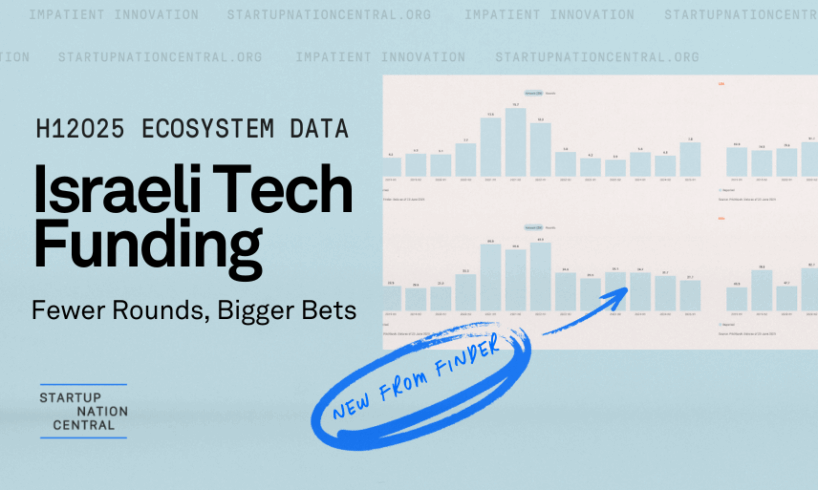
The Israeli tech funding landscape in H1 2025 shows a clear reconfiguration. Deal volume is trending downward, while capital invested is rising significantly. These developments reflect a broader shift in how capital is being deployed. Investors are adjusting their strategies, placing larger bets on companies that show readiness for scale and stronger business fundamentals.
Instead of a high-volume, experimental funding model, the market is prioritizing selectivity, focus, and depth. The latest data points to a funding environment where growth is being built around performance and sustainability rather than acceleration alone.
Fewer Deals, More Capital
In the first half of 2025, Israeli startups raised a total of $9.5B across 367 private investment rounds. This marks a 58% increase in capital from the previous half-year, even as the number of rounds declined by 10%. The median deal size rose to $9M, reaching an all-time high for the ecosystem.
This shift reflects a deliberate approach to capital allocation. Rather than distributing smaller amounts across a wide portfolio of early-stage companies, investors are concentrating resources into companies with proven traction and a defined go-to-market path.
Mega-Rounds Capture Nearly Half of Total Capital
The most significant structural feature of the H1 2025 landscape is the concentration of capital in high-value transactions. Thirteen funding rounds of over $100M accounted for $4.7B, or nearly half of the total raised in the private market.
Among these were Safe Superintelligence’s $2B Series B, as well as substantial rounds raised by Cyera and Rapyd, each securing $500M, and AI21 Labs, which raised $300M.
These mega-rounds reflect the capital intensity of companies operating in infrastructure-heavy sectors such as artificial intelligence, cybersecurity, and enterprise software. The size of these rounds also aligns with a longer time-to-exit trajectory, as companies remain private for longer and prepare for global expansion.
Early and Mid-Stage Funding Signals Strategic Focus
Although total deal count has declined, capital invested in early-stage startups grew. Pre-seed and seed rounds raised $607M, a 50% increase over H2 2024. While the number of early-stage rounds dipped slightly from 157 to 150, average round size increased, showing investor preference for select early-stage companies with a clear business model.
In the mid-stage segment, Series B and C rounds raised $1.68B, up from $1.05B in the previous half. This figure excludes Safe Superintelligence. Including that round, mid-stage capital raised would be more than $3.6B. These companies are positioned to expand into global markets and require deeper investment to support commercialization, market entry, and team scaling.
The emphasis on mid-stage growth reflects capital efficiency rather than growth rate. Investors are prioritizing cost-effective models, customer acquisition performance, and organizational readiness.
Regional Trends Highlight Israel’s Alignment and Strength
Private tech funding across global markets followed a similar pattern in H1 2025, with declining deal volume but increased investment per round. Israel’s growth rate stood out in the global comparison.
Private funding in Israel rose by 62% compared to H2 2024. In contrast, the United States saw a 23% increase, Europe declined by 20%, and Asia saw a 42% decrease. These figures place Israel as one of the few markets where capital deployment increased substantially during a period of widespread contraction.
The pattern of investor behavior in Israel also mirrors trends observed in U.S. markets, particularly in capital concentration and extended round timelines. This alignment reinforces Israel’s positioning within international capital flows and its ability to maintain traction in a selective funding climate.
Evolving Israeli Tech Funding Strategies
Over the past several years, the funding cycle in Israel has lengthened. Between 2019 and 2025, the average time from seed to Series A increased from 18 months to 35 months. Series A to B now takes an average of 30 months. At the same time, round sizes have grown. Series A rounds reached a median of $15M, while Series B rounds climbed to $40M.
This pattern reflects changing investor expectations. Rather than looking for rapid growth signals, investors are placing more weight on unit economics, market fit, and operational discipline. Fewer startups are moving through the funnel from early to growth stage, and those that do are required to meet a higher standard of maturity.
This shift is affecting founders and investors alike. Startup teams are adjusting to longer timelines and building with capital efficiency in mind. Investors are concentrating resources into portfolios that have already passed key inflection points.
Sector Concentration and Strategic Capital Deployment
Capital in H1 2025 tilted strongly toward infrastructure, security, and business platforms. Business software raised $3.2B, followed by cybersecurity with $2.2B. These two sectors together represented more than half of all private capital raised in the period.
Fintech and insurtech brought in $760M, showing renewed interest in capital-light financial technologies. Health tech and life sciences, despite being the largest sector by number of companies, raised $630M, with a median round size of $2.6M. This suggests that most of the capital in this sector is still focused on early-stage innovation, with limited scale-stage investment at this time.
Industrial technologies and defense-adjacent innovation also attracted larger rounds, pointing to investor interest in dual-use technologies and hardware-software integration layers.
Opportunities in Israeli Tech Funding
The H1 2025 funding environment in Israeli tech is shaped by capital selectivity, longer fundraising cycles, and increased average deal sizes. Investors are focused on companies that have a clear growth model and the ability to deliver results across international markets.
The funding structure shows fewer transactions overall, but a significant increase in investment per round. This reflects a focus on measurable progress, capital efficiency, and scale potential.
For startups in Israel, this means a more disciplined path to funding. For investors, it highlights the resilience and adaptability of the ecosystem in a shifting global environment.





